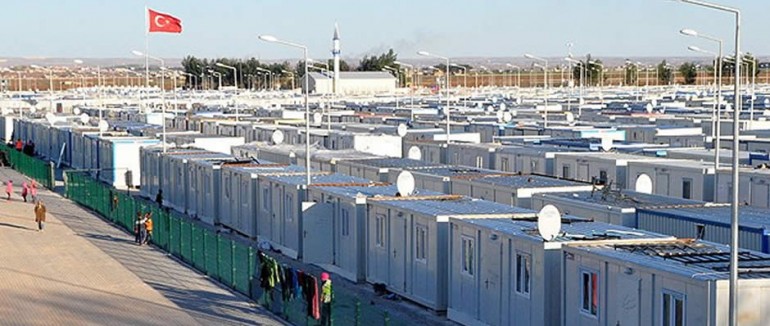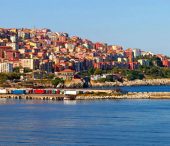World Refugee Day brings to attention the drama of almost 60 million people forcibly displaced worldwide according to the statistics of the United Nations High Commissioner for Refugees.The global refugee population has outnumbered the population of 183 countries around the world. One in every 122 people is a refugee or asylum-seeker. With global displacement from wars, conflict, and persecution at the highest level ever recorded and continuing to increase rapidly, international collaboration and immediate action are of vital importance.
On the World Refugee Day, Turkey stands out as the biggest refugee-hosting country in the world with almost two million refugees. Turkey has worked relentlessly to ensure peace and stability in its region as well as the rest of the world, and, as a principle, has always been among first to extend a helping hand to the victims of humanitarian tragedies. Turkey, as a safe harbour, has made vigorous efforts to fulfil its share of humanitarian duties in regional and international crises from the Holocaust -by hosting the Jews- to the Syrian war -by hosting the Syrian war victims-. Also reaching out to the refugees outside its borders, Turkey has used all available means to help refugees from Rakhine, Somalia, Yemen, and Palestine.
Having received millions of people with different nationalities and religions forced to leave their home country without any discrimination on the grounds of race, religion, language and gender in the past, Turkey has recently opened its doors to almost 1.8 million Syrians fleeing the violence and conflict in Syria. Throughout history, Turkey has been the safe harbour for the Abkhazians, Afghans, Meskhetian Turks, the German, Azerbaijanis, Bosnians, Bulgarian Turks, Circassians, Algerians, Estonians, Georgians, Iraqi Kurds, Iranians, the Spanish, Kazakhs, the Kyrgyz, Crimean Tatars, Kosovars, Hungarians, Jews, the Polish, Russians and Syrians.
Ottoman Empire welcomed Jews
During the Ottoman era, Anatolia hosted many communities from different religions and races. Jews expelled from Spain and Portugal settled in the Ottoman territories upon the formal invitation issued by Sultan Bayezid II in 1492. Similarly, during the Second World War, many Jews living in the German-occupied regions were saved from the Nazi persecution and deportation to concentration camps thanks to the efforts of Turkish diplomats.
Hundred thousands of Bulgarian Turks took refuge in Turkey
Historically maintaining an open door for the oppressed, Turkey was the safe harbour also for the Turks residing in Bulgaria. When the regime that came to power in Bulgaria in 1944 embarked on an assimilation policy against the Turkish minority, hundred thousands of Bulgarian Turks were forced to migrate to Turkey between 1944 and 1952. While migration continued under the “Migration Agreement” of 1968 signed between Turkey and Bulgaria, some 345.000 more people left Bulgaria to find shelter in Turkey in 1989.
Turkey received Afghans and Iraqis
Turkey received more than 4000 Afghans fleeing the Soviet invasion in 1979 as well as the Kurds fleeing the Iran-Iraq war that broke out on September 22, 1980 and the Halabja massacre of Saddam Hussein in 1988. Hundred thousands of Iraqis forced to leave their home country during the First and Second Gulf Wars were hosted in the accommodation centres opened in Turkey.
From Central Asia and Balkans to Turkey
Meskhetian Turks who were deported to Central Asia, particularly to the Fergana Valley of Uzbekistan, during the Second World War and subjected to violence were brought to Turkey and resettled in Iğdır and Hatay provinces based on a decision of the Republic of Turkey in 1992. Between the years 1993 and 2009, 27.728 Meskhetian Turks were granted citizenship of the Republic of Turkey.
Turkey also welcomed the Bosnians who had to leave Bosnia Herzegovina, the stage for one of the bloodiest wars on earth. With the breakup of Yugoslavia beginning in 1990 and the conflicts in the region from 1991 onwards, 20.000 people migrated from Bosnia-Herzegovina into Turkey. Nearly 18.000 Kosovars took shelter in Turkey in 1999 due to the ongoing strife in Kosovo. In 2001, Turkey also opened its doors to 10.500 people from Macedonia.
Turkey extends a helping hand to Syrians
Maintaining its long-standing policy of humanitarian aid, Turkey continues to extend a helping hand to refugees in various corners of the world, particularly the Syrians fleeing the conflict in their home country.
Based on its tradition of humanitarian aid, Turkey has been pursuing an “open door” policy to Syrian civilians since 2011 and is currently hosting more than 1.8 million Syrian citizens. Under this policy, Turkey is carefully observing the principles of “non-refoulment” and “non-rejection at the border” and provides “temporary protection” for the Syrians as per international law.
“Temporary protection status” granted to around 2 million Syrians
Turkey has granted “temporary protection status” to Syrian guests sheltering in our country and has been extending aid in numerous fields, particularly health, food and education. Whereas the European Union, consisting of 28 member states and encompassing a five times bigger surface area, has accepted and granted protection status to only 120 thousand Syrian citizens since 2011, the number of Syrians accommodated in Turkey has almost reached 1.8 million.
6 billion aid from Turkey
The volume of humanitarian aid provided to the Syrians by Turkey, dubbed the “most generous country” of the world, has already exceeded $6 billion. On the other hand, the amount of aid extended by international institutions and organizations and all other countries to the Syrians in Turkey is not more than $300 million.
More than 250.000 Syrians in Turkey are currently accommodated in 25 accommodation centres with regular access to sheltering, education, health services and psychological support. In these centres, Turkish and Arabic teachers have provided education to 75.000 students according to their national curriculum and more than 40.000 people have been given vocational courses. Syrian and Iraqi guests at the accommodation centres also have access to medical treatment free of charge. Within the last four years, more than 3.5 million patients have been treated at the accommodation centres while 600.000 patients have been referred to hospitals and more than 300.000 operations have been conducted free of charge.
Transboundary aid
Turkey does not hesitate to provide aid to refugees outside its borders as well. Relevant Turkish institutions and non-governmental organizations continue to exert coordinated efforts to reach out to thousands of Rohingya Muslims denied citizenship and persecuted by the Myanmar government. Turkey has been carrying out efforts to reach the Rohingya refugees abandoned at sea and, has pledged to donate $1 million to help the Rohingya Muslims.
Turkey also continues to use all available means to help the Afghan refugees residing in different regions of the country as well as around 5000 Palestinians from Syria. Turkey has also extended humanitarian aid to Somali refugees in Ethiopia-Jijiga, Yemen refugees sheltering in Obock camp of Djibouti as well as the refugees in Mauritania, Senegal and Niger.
Turkey as a role model hosting the largest number of refugees in the world
According to the Global Trends 2014 report released by the United Nations High Commissioner for Refugees, Turkey is the largest refugee hosting country in the world. Turkey was followed by Pakistan (1.51 million), Lebanon (1.15 million), Iran (982 thousand), Ethiopia (659 thousand 500) and Jordan (654 thousand 100) respectively. Turkey has been regarded as a role model by many countries and international organizations, particularly the UN, for the camps and accommodation centres established with the coordination of the Disaster and Emergency Management Authority (AFAD) as well as the services provided in these camps.
Safe Harbour Exhibition
The Safe Harbour Turkey Exhibition showcases the humanitarian approach adopted towards the communities who took refuge in the Ottoman Empire and later the Republic of Turkey since the 15th century. The exhibition tells through photographs and documents the stories and life histories of those displaced people who sought shelter in Turkey. The exhibition has been displayed in New York, Washington, Ottawa, Geneva, Berlin, Vienna, Strasbourg, Brussels and Paris, and seeks to build global awareness about the issue.
Sources: http://www.kdk.gov.tr/






